
The wasp is a predator that can sting continuously without injury. Bees, however, are non-aggressive, shorter and fatter, love hanging around flowers, and live in hives. Hornets build joint nests by eating up and chewing wood till they become a paper pulp. Like the wasps, they also display a form of aggression when disturbed by animals and humans in their homes. The hornet, unlike some other insects, can produce a hormone that alerts other hornets in their communal home to impending danger. With all these differences, infestations of these insects on your property will require the knowledge of expert pest control in Niagara.
Wasps, Bees, and Hornets – What Makes Them Different
One important difference between wasps and bees is in their actions and activities which in turn is because of the varying ecological roles they naturally play. Bees are generally flower-visiting pollinators while wasps are expert scavengers. Like rats, raccoons, cockroaches, and pigeons, wasps have grown well on the messy and wasteful ways of humans, and their scrap-cleaning proficiency has come as a big favour to us, by helping to control some of the waste we create. However, their benefit is soon equalled in worth by their nuisance. Hornets with their thin, elongated bodies look a lot like wasps. Although hornets have no body hair but do possess three pairs of legs, three body segments, and a pair of antennae. Astonishingly, hornets are insectivores. This makes them notably different from wasps and bees as they make other insects their primary diet.
Wasps, Bees, Hornets and Their Stinging Abilities
Nearly all bees can sting, and have a tendency to avoid possible predators, especially humans. When a bee stings, it is usually fatal for them as their abdomen and the digestive track gets torn apart once they remove their barb-shaped stinger fastened to the enemy’s flesh. The bee then dies after a short time. Wasps, on the other hand, are known to be aggressive with their stings especially when their home is in peril. A wasp can sting their enemy many times without any consequence, though people tend to react badly to the venom in their sting. Unlike wasps and bees, hornets are considered as one of the deadliest stinging insects. Hornets will sting their enemies with no remorse. Hornets are also able to alert other hornets in the area, drawing them in to help with the attack. Stinging their target relentlessly.
How to Protect Yourself from Stings
When you are outdoors, your safety should come first. There are different buzzing insects all over the place. Some of them stay a reasonable distance from you while others would love to know to get as close to you as possible. To protect yourself from these persistent insects, avoid using things that will draw their attention. You may smell like a flower when you wear colognes or perfumes which bees and wasps can easily be drawn to. Be careful about what you consume outdoors. Bees and wasps are naturally attracted to sugary food and may confront you to get to it. Avoid walking barefoot as you might step on a nest housing wasps or hornets. In the event of an infestation, call a professional like pest control Niagara to have unwanted bees, wasps, or hornets removed.
Getting stung by wasps, bees and hornets is painful and can become a life-threatening situation for people who are allergic. As much as staying outdoors brings fun and relaxation, do not overlook the fact that different types of insects are somewhere in the open. Take the necessary precautions when outside your home, avoid wearing perfume, and eating sugary foods that may attract these buzzing insects. Also, remember to enlist the services of pest control Niagara in the event of an insect attack or infestation.